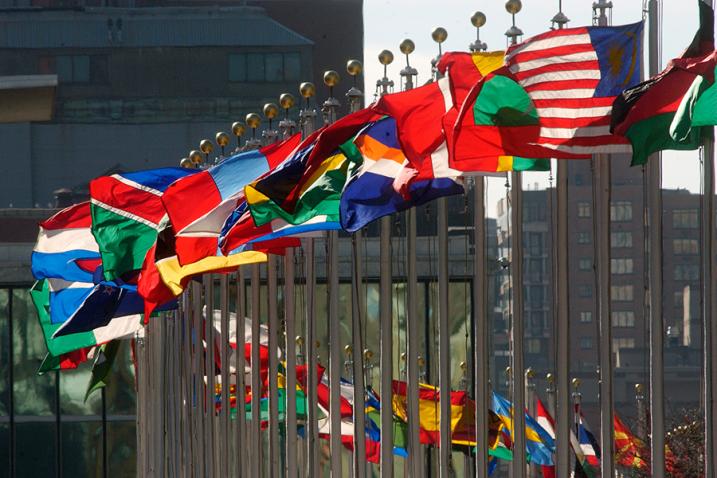The United Nations (UN) stands as a global beacon of hope, aspiring to foster peace and cooperation among nations. While many may be familiar with the UN’s objectives, the question of where the organization is based and its worldwide missions can evoke a deeper contemplation, especially from a Christian perspective. Understanding the UN’s headquarters and its initiatives provides a unique opportunity to reflect on the interconnectedness of our global community, the moral imperatives of peacekeeping, and the roles individuals can play in the pursuit of justice and charity.
At the heart of the United Nations lies its headquarters, situated in the bustling metropolis of New York City. This distinguished location is not merely a fortuitous arrangement; it embodies the UN’s mission of uniting diverse cultures and nations under a common goal. The complex, which spans a remarkable 17 acres along the East River, is not only an architectural marvel but a symbol of international cooperation. The design, characterized by both modern aesthetics and enduring functionality, instills a sense of hope and determination.
Yet, the significance of the UN extends far beyond its brick-and-mortar walls. The organization is a tapestry woven with threads of aspiration, each of its operations reflecting a commitment to fostering peace, promoting human rights, and facilitating development across the globe. The UN engages in a variety of missions, each tailored to address specific challenges faced by member states, thereby creating a unique synergy between localized needs and global initiatives.
Perhaps one of the most poignant activities undertaken by the United Nations is peacekeeping. These missions are conducted in regions grappling with conflict and instability, where the shadows of war hinder human flourishing. From the lush green hills of Africa to the tumultuous terrains of the Middle East, UN peacekeepers are dispatched with the noble intent of restoring order and creating an environment conducive to dialogue. In many respects, these missions resonate deeply with Christian teachings, which extol the virtues of peace, reconciliation, and the pursuit of justice. Just as Jesus called for the peacemakers to be blessed, so too does the UN strive to embody that challenge in international relations.
Furthermore, the UN champions various humanitarian initiatives that align closely with Christian doctrines of charity and compassion. The United Nations Children’s Fund (UNICEF), for instance, works tirelessly to provide essential services to children in need. Through advocacy and support, UNICEF mitigates the impact of poverty, disease, and violence on the world’s most vulnerable populations. In this light, one can see an intersection between the UN’s objectives and the Christian calling to uplift the downtrodden.
Another compelling aspect is the UN’s commitment to the Sustainable Development Goals (SDGs). Established in 2015, these 17 overarching goals aim to tackle pressing global issues ranging from eradicating poverty and hunger to promoting gender equality and environmental sustainability. Each goal is a clarion call to action, urging individuals and nations alike to participate in the transformation of the world. For Christians, this vision resonates with the biblical call to stewardship over creation and the duty to serve one’s neighbor. By aligning efforts with these goals, believers can contribute to a collective pursuit of righteousness that transcends cultural and geographic divides.
As we reflect on the missions of the United Nations, it becomes evident that empathy and compassion are cornerstones of its operation, principles that are also deeply woven into the fabric of Christianity. Whether in the form of providing relief during humanitarian crises or mediating in tense geopolitical situations, the UN investigates the root causes of human suffering, echoing the prophetic traditions that demand justice and love towards our fellow beings.
One cannot overlook the UN’s global offices, which operate in regions where the need for intervention is paramount. These branches embody the call to “go forth and serve,” as they act as extensions of the mission rooted in the headquarters in New York. The proliferation of these offices underscores the idea that peace and justice are not confined to lofty discussions held in conference rooms but must permeate every society, reaching those who stand on the margins.
Thus, the geographic significance of the UN headquarters and its missions holds profound implications when viewed through a Christian lens. New York City, as the global center for diplomatic activity, serves as a microcosm of the world’s diverse nations and peoples. It encourages us to look beyond our immediate circumstances and engage with the broader human experience. We are reminded that our collective responsibility extends beyond national boundaries and into the deep waters of global interdependence.
In conclusion, the United Nations continues to inspire a promising shift in perspective, inviting us to ponder our roles within this grand narrative of humanity. From its New York City headquarters, the UN extends its reach through peacekeeping missions and humanitarian efforts, fostering hope and illuminating paths towards justice and unity. For Christians, aligning with these principles not only serves to advance the cause of peace but also fulfills a sacred duty to love, serve, and honor all of God’s creation. The UN stands as a reminder that we are all invited to participate in a higher calling, one that seeks to bring about a more just and compassionate world.



